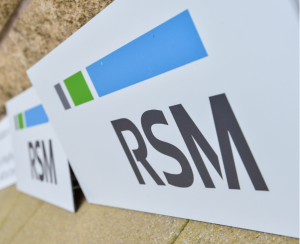RSM’s Weekly Tax Brief – 1 June 2016
 In this edition of RSM’s weekly round-up of the most important tax news, we cover the latest developments.
In this edition of RSM’s weekly round-up of the most important tax news, we cover the latest developments.
- HMRC announces crackdown on routine tax planning
George Bull
HMRC’s latest single departmental plan has just been updated, and announces (amongst other things) plans to invest in tackling tax evasion and non-compliance, improve customer services and increase prosecutions. However, a new commitment to tackle ‘tax planning’ marks a sea-change in HMRC’s approach…
- Why are image rights so Messi?
Bill Longe
The trial of Argentina and Barcelona footballer Lionel Messi on tax fraud charges has begun, with the footballer accused of concealing the considerable sums of money he earned from image rights. So why all the hoo-hah about some nice-looking photos of footballers, and can we expect to see HMRC carry out similar investigations into our Premier League footballers anytime soon?
- ‘New broom’ opens first major economic debate of new Scottish Parliament
Shirley McIntosh
This week saw the Scottish government’s new economy secretary, Keith Brown, hold his first economy debate of the new Scottish parliament. Over the next few months Mr Brown will really have his work cut out – especially in light of figures just published which will almost certainly be giving him sleepless nights over the Scottish property market…
- Chance for tax simplification goes begging as government ignores the obvious
Rebecca Reading
Last week we saw the release of a number of corporate tax consultations announced in the Budget earlier this year. The government has already pledged to make the UK tax system simpler, so have they missed a trick here?
- Jumping the gun – HMRC’s increasing trend towards penalties for ‘deliberate’ errors
Mike Down
HMRC’s increasing trend in arguing that errors on tax returns are the result of ‘deliberate’ behaviour rather than genuine mistakes has not gone unnoticed in Tax Brief. And more recently, a Tax Tribunal case has proved what we believed all along…
- My HMRC – right or wrong?
Sarah Saunders
It’s a simple error – you pick up the wrong form, fill it in, and send it off to the authorities. In most cases you can fill in a new one, and hey presto – the mistake is rectified. But sadly not when it comes to applying for tax relief it appears…
- HMRC announces crackdown on routine tax planning
Under Treasury Minister David Gauke, HMRC’s single departmental plan has become a document of serious intent, and one which those interested in taxes ignore at their peril. The big picture continues to evolve steadily: record amount of taxes collected – more being invested in tackling evasion and non-compliance – more prosecutions – improved customer services – better use of resources – you get the picture.
The updated report published on 24th May 2016 contains something new: it promises to raise an extra £5bn a year by 2019/20 by tackling tax avoidance, evasion, compliance issues (all of that we might reasonably expect to happen) and by tackling tax planning (emphasis added). This marks a sea-change in HMRC’s approach.
For years, it has been established through the courts that nobody is required to pay the maximum amount of tax in any particular set of circumstances. Far from it. Everybody is entitled to organise their affairs to legitimately reduce their tax liabilities, subject to not falling foul of the General Anti-Abuse rule. Of course, tax evasion remains wholly illegal, separated from tax avoidance by the thickness of a prison wall. Tax avoidance, particularly artificial tax avoidance, has been the subject of a successful and sustained attack by HMRC for many years now. But the threat to tackle routine tax planning is completely new.
Without a doubt, the squeeze on tax planning has been there for some time. The Chancellor’s Budget speech 2015, for example, had a section on combatting evasion, avoidance and aggressive tax planning. What’s new and significant is that the word ‘aggressive’ seems to have been dropped.
So what exactly is meant by tax planning? Most of the tax planning we see involves individuals and companies doing no more than claiming the tax reliefs to which they are entitled, for purposes specifically intended by Parliament. Here are some examples:
- Wills – making use of the spouse exemption for inheritance tax;
- Structuring investments to secure entitlement to entrepreneur’s relief (capital gains tax), business property relief (inheritance tax) and also enterprise investment scheme (EIS relief) and seed enterprise investment scheme (SEIS relief).
- Retirement income – using spouses pension allowance to provide joint income in retirement.
Make no mistake, an attack on routine tax planning would be a major shift in HMRC’s approach and would seem to pit the Administration (in the form of HMRC) against the Legislature (Parliament) which has enacted specific legislation for specific purposes. With the prospect of HMRC imposing a requirement for individuals and companies to pay the maximum amount of tax in any particular set of circumstances, we asked HMRC to indicate exactly what they intend to do. At the time of pressing the ‘send’ button, they have failed to do so.
Watch this space – but if the plain words of the HMRC single departmental plan are to be taken at face value, it looks as though we can expect a seismic shift in the way taxes are dealt with in the UK.
- Why are image rights so Messi?
The trial of Barcelona and Argentina footballer Lionel Messi on charges of tax fraud opened this week after the Spanish tax authorities investigated the tax returns of the football superstar. Along with his father he is charged with not declaring income received from image rights contracts with leading companies such as Adidas and Pepsi-Cola.
Lionel Messi is not the only Barcelona footballer to have had his collar felt by the Spanish tax authorities recently as it is apparent footballers are proving to be a rich source of revenue and publicity for this agency.
What are image rights and are they used simply as a means to avoid paying the right amount of tax?
As we all know from various advertisements on TV and in the newspapers our top footballers do much more than kick a ball around for their chosen teams. Images of them and their signatures and are much sought after by commercial organisations to help them raise profile and increase sales of their products and services. These ‘off the pitch’ earnings can be significantly greater than the income from their chosen sport particularly as they can often last way beyond the playing career. Structured correctly, they can provide longer term income for the player and his family.
The bundling together of various intellectual property rights such as trademarks, copyrights and other contractual rights form the backbone of an image rights contract. It is vital to the tax treatment that these rights can be commercially exploited and that an organisation will pay good money to use those rights.
The rights will generally be held by a Company and if the player is a foreign national they will normally be held by an offshore Company.
The bundling together of the rights, transfer to a company and subsequent commercial exploitation is extremely complex and so it is hardly surprising they can cause the sort of problems experienced by Messi.
Can we expect HMRC to carry out similar investigations into image rights of Premier League footballers?
Perhaps not. HMRC carried out a significant number of investigations into their use a number of years ago following which it introduced a raft of tax avoidance legislation. Helpfully it also made public its own internal guidance and so footballers should be well aware of HMRC approach and thus avoid any problems when completing their returns.
- ‘New broom’ opens first major economic debate of new Scottish Parliament
The last day of May saw the first major economic debate of the new Scottish Parliament. The duties of former Finance Secretary, John Swinney, have now been split in two to recognise the added responsibilities that devolved taxes will bring to the job. Keith Brown as Economy Secretary opened the debate providing the SNPs vision of what needs to happen in the Scottish economy in this parliament.
Not many specifics were discussed and the debate provided an opportunity for some maiden speeches. Calls to increase taxes in order to fund improvements to education particularly were made in line with the party manifestos for the recent parliamentary elections.
Ultimately the motion finally approved by the Parliament made only limited reference to tax with an expressed need for, amongst other things, a “competitive business tax system” to support the requirements for improvements to skills, education, infrastructure and health that will be necessary to improve productivity in Scotland.
What this will mean for Scottish taxpayers will be unveiled in the Scottish Budget later this year, widely expected to be in November, which will be presented by Derek Mackay picking up the other half of Mr Swinney’s former post. However, with no control over corporation tax, options for business taxes will be limited.
Further problems have been highlighted by figures recently published showing a shortfall in the tax raised from Land and Buildings Transaction Tax. This, when taken together with analysis of trends in the Scottish property market, have prompted calls across the industry for a rethink – particularly of the impact on the higher end of the market.
The minority SNP government faces a difficult job ahead securing support for its programme given the diversity of views across the other parties, particularly in relation to tax policy. It is broadly in favour of increasing tax rates at the upper end, but has concerns about the possible behavioural effects that might actually reduce the funds available to it.
Mr Mackay has a hard few months ahead of him, and we await with interest his first budget.
- Chance for tax simplification goes begging as government ignores the obvious
Last week saw the release of various corporate tax consultations that were announced in the Chancellor’s Budget back in March. One covers proposals to reform the Substantial Shareholdings Exemption. At the risk of over simplification, broadly this is a measure that gives exemption from tax when trading groups sell shares in their subsidiaries. It also prevents tax losses arising in the same circumstances, so essentially trading groups can make commercially driven disposals tax free.
The consultation looks at a range of changes, and probably represents a widening of the exemption rather than a restriction; however an obvious opportunity for genuine simplification is being missed.
The UK tax legislation for corporates includes two other sets of measures – one being an exemption for dividends received by companies, provided the conditions are met, and another being targeted Controlled Foreign Companies rules. Taken together, these two plus the Substantial Shareholding Exemption are aimed at the same thing; that is to exempt in most circumstances or to tax in some circumstances the profits made by a company owned by a UK corporate tax payer. As things stand, the three sets of rules are entirely separate and contain different tests that can be complicated to apply. At their heart, though, do they not have the same policy objective? To encourage groups to choose the UK as a location from which to make and manage outbound investment.
The government says it wants to simplify the UK tax system as well as making it most competitive in the G20. They even state in the consultation’s introduction that some have concerns that the Substantial Shareholding Exemption itself is too complicated. Whether this is the case or not, the government should be bold enough to do the obvious – take the three sets of legislative provisions and rewrite them into one brand new set of rules (incidentally did suggest this in a meeting with HMRC back in 2009, but no-one seemed to have considered it).
- Jumping the gun – HMRC’s increasing trend towards penalties for ‘deliberate’ errors
We’ve commented recently on an increasing trend by HMRC to argue that errors when completing tax returns are the result of ‘deliberate’ behaviour rather than genuine mistakes.
When the new ‘behaviour-based’ penalty regime was introduced eight years ago, HMRC’s initial stance was to start on the pretext that a simple mistake had occurred and only if not, then to work upwards through ‘carelessness’ to ‘deliberate’, and ultimately to ‘deliberate with concealment’ – the latter being the most serious. In monetary terms, ‘prompted’ irregularities attract no penalty if behaviour represents a simple mistake or misunderstanding, a minimum of 15% if ‘careless’, and 35% if ‘deliberate’. In addition to this, other sanctions such as ‘20 years of back year assessments’ and ‘naming and shaming’ could follow if ‘deliberate’ behaviour was established.
Over the past year or so we’ve seen HMRC’s approach change. Tax officers now seem to start at the top end, then working downwards through to the less serious behaviour categories.
A recent First Tier Tribunal case gives a clear example of this.
A taxpayer died in October 2012 with the executors filing an inheritance tax return in January 2013 and seeking probate. A 2012/13 self-assessment income tax return to the date of death was submitted to HMRC in August 2013, and the executors sent HMRC a cheque in final settlement of the tax due a month later, indicating they were finalising and distributing the estate. HMRC responded some 12 months later querying the accuracy of the income shown in the tax return, and an assessment was raised to collect the additional income tax due.
Whilst accepting HMRC’s figures, the executors made a formal complaint about HMRC’s delay – they had after all already distributed all monies. A penalty determination followed on the grounds that the executors had deliberately understated the income. At a later Tribunal hearing, HMRC accepted that ‘insufficient care had been taken to ascertain all the circumstances before categorising the executors action as deliberate’, and saying they now accepted the errors could be put down to ‘carelessness’. The question of mitigation for ‘special circumstances’ was then considered. Although the Tribunal was unable to comment on maladministration, it concluded that HMRC’s delay represented a ‘special circumstance’ and reduced the net penalty to nil.
We would urge HMRC to take a more careful and considered approach to inaccuracy penalties. After all, taxpayers are only human…
- My HMRC – right or wrong?
We can only sympathise with the appellant in a recent tax case. They were seeking to get clearance for Seed Enterprise Investment Relief (SEIS) – which is aimed at start-up companies and comes with 50% tax relief – for their investors. They accidentally selected a form seeking clearance for the Enterprise Investment Scheme (EIS), offering only 30% relief.
HMRC authorised the company to issue EIS relief certificates to its investors. Neither side noticed the error until the firm sought clearance for further SEIS investment, and was refused because it had made a prior EIS claim. At this point the company realised its error.
It seems a simple mistake, and you’d hope an apology and adjustment to the correct relief would follow. However, although it was agreed the investors would have qualified for either scheme had the appropriate form been submitted, HMRC ruled this couldn’t be amended. The taxpayer appealed to the Tax Tribunal where it became clear there’s no provision in the legislation to correct such a simple error. Once EIS relief was granted, there was no way to unwind things lawfully or ignore the claim in relation to any future SEIS claim.
It’s of concern that HMRC would not concede that an innocent error had been made – even though the Tribunal accepted the taxpayer had abundant evidence on the intention to claim the more generous SEIS.
In a similar VAT case, a taxpayer failed to notify HMRC he’d taken his son into partnership with him. He continued to complete returns and pay VAT, but when he advised HMRC more than twelve months later, they fined him £582 for failure to notify – even though there was no loss to HMRC.
This is in contrast to another case where an application was wrongly filed for treaty clearance (for ten per cent withholding tax on interest/royalties) instead of the zero tax rate Interest & Royalties Directive. Here HMRC agreed to accept the forms were intended for the Interest & Royalties Directive and confirmed a zero rate. Was this a difference in legislation or a difference in attitude?
It’s a sad reflection of the state of tax law that trivial mistakes can result in substantial loss of money, and that there’s no provision to overturn an unintended consequence of law which is patently unfair. It seems some elements at HMRC sometimes forget that their job is to collect the correct tax, not the most tax possible
Disclaimer: This communication is intended to provide general guidance on matters of interest and you should not act or refrain from acting upon any information contained in it without seeking appropriate professional advice on the particular facts and circumstances at issue.
Go to the main page
Tags: Birmingham News, George Bull, Graduate Recruitment Business Information Portal Business How to Guides, National, National Birmingham Events, RSM, RSM UK, Senior Tax Partner, The BIP Birmingham Business News, West Midlands Business News, West Midlands News


































